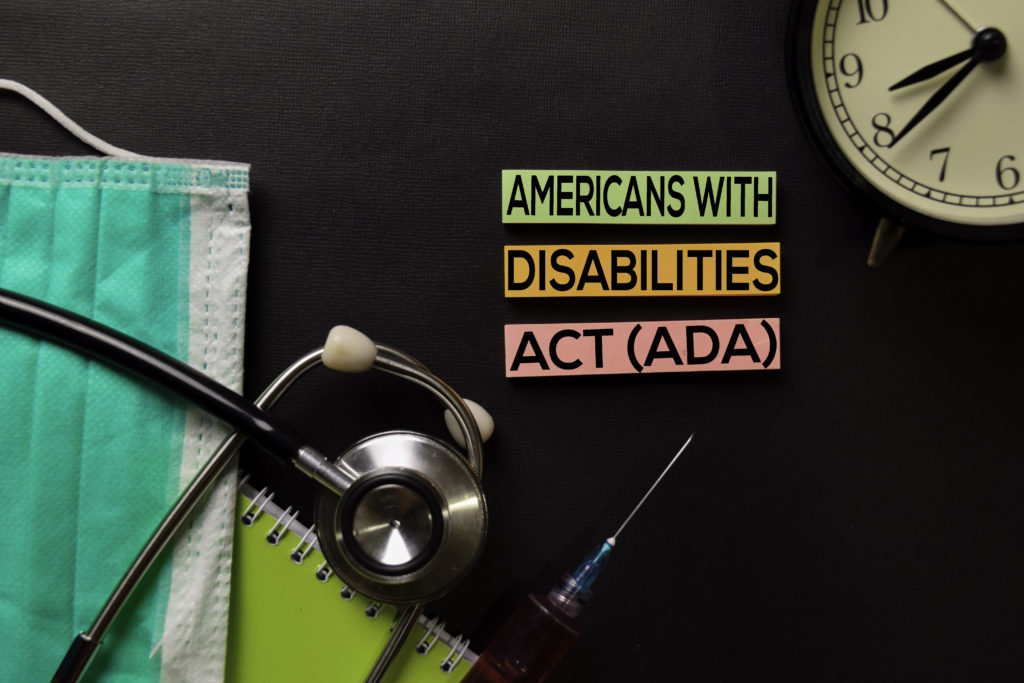Reasonable Accommodations Required During COVID-19

As the country continues to combat COVID-19, employees must be aware of their rights and ensure that their employees comply with all federal, state and local labor laws including the American with Disabilities Act (ADA). Under the ADA, federal law requires employees provide reasonable accommodations for disabilities covered under the act. However, according to the U.S. Equal Employment Opportunity Commission (EEOC), the most common complaint being filed by employees during the pandemic is employers failing to accommodate their disabilities.
The ADA has specific provisions regarding accommodations that employers must provide to employees with disabilities regardless of the extenuating circumstances due to COVID-19. Generally, the ADA requires employees to modify an employee’s job or work environment in order to ensure an employee with a disability is able perform the essential functions of their job. According to the law, the employer must make all “reasonable accommodations” as long as there is no “undue hardship.” As with many statutes, the legal definitions may not be obvious, so you should consult an experienced employment law attorney to explain the law and your rights.
The protections under the California state equivalent to the ADA are found in the California Fair Employment and Housing Act (FEHA). The FEHA protects employees with a physical or mental disability and requires employers provide reasonable accommodations such as changing work schedules, relocating the work area, modifying job duties and providing leave for medical care.
With the additional health and safety concerns due to COVID-19, all employees, particularly employees with disabilities must ensure their rights are not being violated. For example, some employees may have an underlying condition that creates a greater risk for COVID-19. Under both federal and state labor laws, the employee is entitled to reasonable accommodations to ensure their safety in the workplace if the risk is directly related to the disability.
The added health risks due to COVID-19 have impacted many aspects of labor law and the workplace, particularly if an employee has an existing qualified disability under the ADA or FEHA. Federal and state labor laws offer a wide range of protection besides accommodations. For example, all medical information of employees, related to a disability or COVID-19, must be confidential. Moreover, the ADA and FEHA provides protections to prospective employees and require hiring policies that provide equal opportunities to applicants regardless of any disability. Again, the employer must provide a reasonable accommodation to an applicant as long as it would not create an undue hardship.
If you believe your employee is violating your rights as an employee under the ADA or FEHA, you should consult an experienced employment law attorney to discuss your case and options.
FREE CONSULTATION
Srourian Law Firm, with locations in Los Angeles, Westwood, Woodland Hills, and Orange County is experienced in all aspects of employment law including ADA and FEHA violations and have aggressively represented employees in Los Angeles, Hollywood, Santa Monica, Orange, Irvine, Anaheim, Santa Ana, Newport Beach, Costa Mesa, Fullerton, Tustin, Mission Viejo, San Clemente, Garden Grove, Laguna Niguel, Brea, Fountain Valley, Aliso Viejo, Yorba Linda, Westminster, Laguna Hills, Cypress, and La Habra.
If you or someone you know suffered employment violations as an employee including ADA or FEHA violations, you may have certain employee rights under state and federal law, and may be entitled to compensation as a part of the class action lawsuit. Please contact us to speak with one of our lawyers for a free consultation.
Know the Law. Know your Rights.

Most people eagerly await payday in order to pay rent and bills on time, or maybe to splurge a little. Getting a late paycheck, regardless of the reason, is not only frustrating, but it could be against the law. Under California labor laws, employers must pay you on time, or they are violating your rights and breaking the law.
In general, employees must be paid by a certain date depending on whether paychecks are issued every two weeks (bi-weekly) or twice a month (bi-monthly). There are some narrow exceptions that apply to certain types of employees, such as salaried monthly executives, but the vast majority of employees are protected under California Labor Code section 204(a).
California Labor Code § 204(a) (in relevant part)
Labor performed between the 1st and 15th days, inclusive, of any calendar month shall be paid for between the 16th and the 26th day of the month during which the labor was performed, and labor performed between the 16th and the last day, inclusive, of any calendar month, shall be paid for between the 1st and 10th day of the following month.
For example, if an employee is paid twice a month, the pay period is often divided into the 1st through 15 days of the month; and the 16th through the last day of the month. Under California law, employers must issue paychecks no later than the 26th of the month for the first pay period, and the 10th of the following month for the second pay period.
For employees that are paid every two weeks, or weekly, the law requires employers issue checks within seven calendar days after each pay period. Failure to issue timely paychecks could subject employers to significant penalties.
Also, according to California Labor Code section 204(b)(1), Employees have a right to be paid for overtime by the next regular paycheck. That means if you accrue overtime during a particular pay period, those extra wages must be included in the next paycheck. Again, if your employer fails to pay you overtime wage on time, your rights have been violated and you should seek legal advice.
FREE CONSULTATION
Srourian Law Firm, with locations in Los Angeles, Westwood, Woodland Hills, and Orange County is experienced in all aspects of employment law including failure to receive paychecks on time and have aggressively represented employees in Los Angeles, Hollywood, Santa Monica, Orange, Irvine, Anaheim, Santa Ana, Newport Beach, Costa Mesa, Fullerton, Tustin, Mission Viejo, San Clemente, Garden Grove, Laguna Niguel, Brea, Fountain Valley, Aliso Viejo, Yorba Linda, Westminster, Laguna Hills, Cypress, and La Habra.
If you or someone you know suffered employment violations as an employee such as not receiving paychecks on times in California, you may have certain employee rights under state and federal law and may be entitled to unpaid wages, interest, attorneys’ fees and costs, and/or be entitled to compensation as a part of the class action lawsuit. Please contact us to speak with one of our experienced lawyers for a free consultation.


